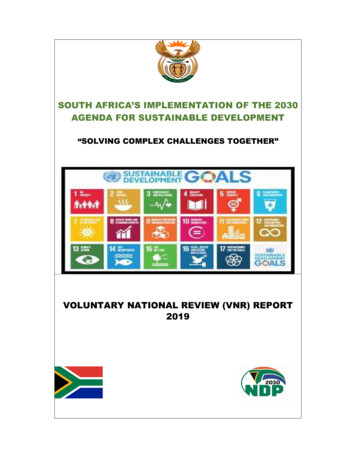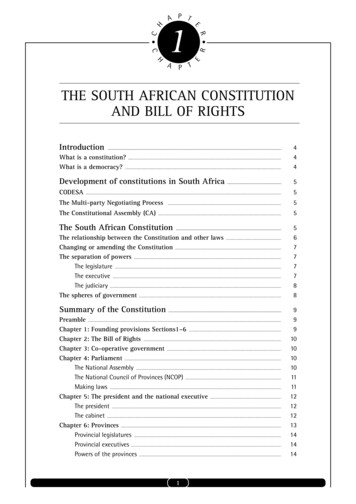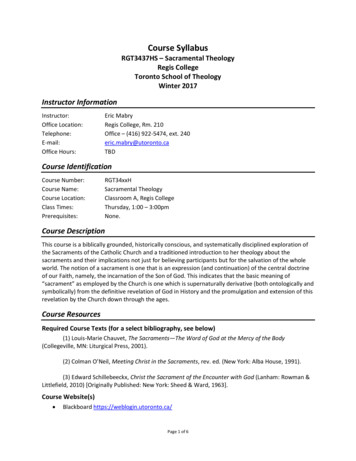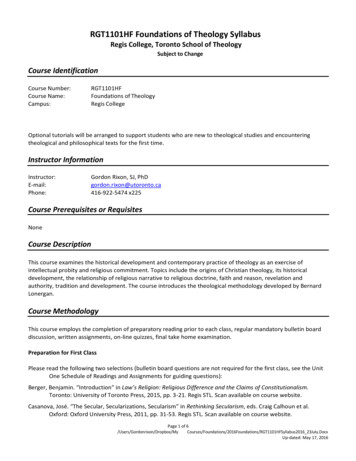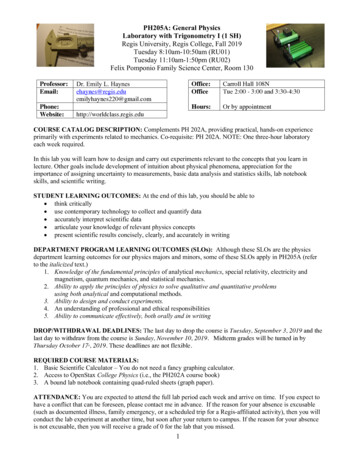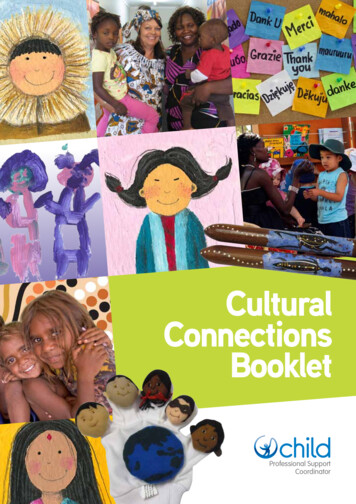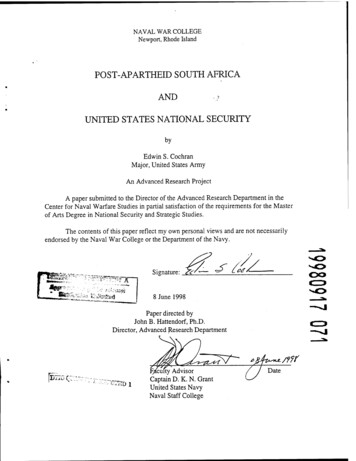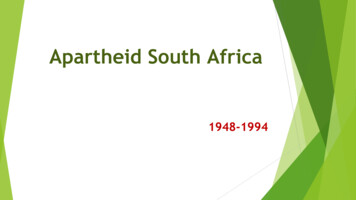
Transcription
Apartheid South Africa1948-1994
APARTHEID INSOUTH AFRICATo understand the events that led to the creation of anindependent South Africa.To understand the policy of apartheid and its impact.To understand what caused the end of apartheid and thechallenges that remain.
Colonization:Settling in another country& taking it over politicallyand economically.
Cultures ClashThe Dutch were the firstEuropeans to settle inSouth Africa.They set up a tradestation near the Cape ofGood Hope.The Europeans who settledin South Africa calledthemselves Afrikaners.Eventually, the British tookcontrol of most of SouthAfrica.
Cultures ClashThe British and theAfrikaners (also known asthe Boers) fought eachother for control ofSouth Africa.The British also foughtwith the Zulu tribe.The British eventuallydefeated the Afrikanersand Zulus and declaredSouth Africa anindependent country in1910.
The Birth of ApartheidThe white-controlledgovernment of SouthAfrica created laws tokeep land and wealth inthe hands of whites.They created a system calledAPARTHEID, which was designedto separate South Africansociety into groups based onrace: whites, blacks,Coloureds, and Asians.
What is Apartheid?System of racial segregation in SouthAfrica.Lasted from 1948-1994Created to keep economical and politicalpower with people of Englishdescent/heritage
National Party (1948)National Party PrimeMinister (1948-1954),Daniel Malan (Afrikaner)In 1948, the National Party came topower in South Africa.Promoted Afrikaner, or Dutch SouthAfrican, nationalism.Instituted a strict racial segregationpolicy called apartheid.In 1961, South Africa was grantedtotal independence from GreatBritain.
Leaders of theAnti-ApartheidMovement
Steve Biko: Anti-Apartheid MartyrFormed the Black Consciousness Group:He provided legal aid and medicalclinics, as well as helping to developcottage industries for disadvantagedblack communities.Banned from South Africa for hisprotests, arrested four times and madeto follow restrictions of travel and publicappearances.His philosophy that political freedom could only be achievedif blacks stopped feeling inferior to whites attractedenormous international attention, and is considered by manyto be the turning point in the demise of apartheid.
Bishop Desmond TutuSpent his life speaking out againstinjustice and oppression.Led a worldwide economic campaignagainst apartheid. He asked foreignnations not to do business with SouthAfrica.Many nations imposed traderestrictions on South Africa.UN condemned the South Africangovernment on human rightsviolations.Since the 1960s, South Africa was notallowed to join the Olympic games.
F.W. De KlerkElected by white South Africans as thenew president in 1989.He legalized the ANC and releasedNelson Mandela from prison.Apartheid laws were repealed.Agreed to hold elections in 1994 inwhich people of all races could vote.
Other Leaders of theAnti-Apartheid Movement
NELSON MANDELASTEVEN BIKOWALTERSISULUCHRISHANIDF MALANCHIEF ALBERTLUTHULIPW BOTHA
Who disagrees with Apartheid?Nelson Mandela:Born: 18 July 1918A South African Politician—against apartheid, led protest group1944: Joined African National Congress (referred to: ANC)1964: Was imprisonedRecognized as the most significant Black leaderThe first South African presidentStephen Biko:Born: 18 December 1946Expelled from his high school because of political activitiesWas involved in the NUSAS (National Union of South African Students)Quits medical school for his concern of the Apartheid policy and the struggle of the Black1968: Co-founder and first president of the all-Black South African Students’ Organization (SASO)1973: Because of political activities, he was ‘banned’ in South Africa18 August 1977: imprisoned12 September 1977: died while in prison due to extremely severe treatments from police officers.Chris Hani:Born: 28 June 1942
Ethnic Composition Of South Africa
Laws Instituted By The SouthAfrican GovernmentThe Population Registration ActThe Group Areas ActPass LawsBantu Homelands Citizenship Act
How Was Apartheid Enforced?In 1953, the Public Safety Act and theCriminal Law Amendment Act were passed:
Enforcing Apartheid Empowered the government to declare states of emergency Increased penalties for protesting against the law. Penalties included fines, imprisonment and whippings.
The Impact of ApartheidProhibition of Mixed Marriages Act, Act No55 of 1949prohibited marriages between white people andpeople of other races.Population Registration Act, Act No 30 of1950led to the creation of a national register inwhich every person's race was recorded.Group Areas Act, Act No 41 of 1950forced physical separation betweenraces by creating different residentialareas for different racesExtension of University Education Act,Act 45 of 1959put an end to black students attendingwhite universities
Who suffered the most from Apartheid?ALL NON-WHITE SOUTH AFRICANSSOTHO-TSWANA PEOPLEZULU PEOPLESAN (BUSHMEN/HUNTERGATHERERS)NAMAQUA (PEOPLE LIVING A SEMINOMADIC PASTORAL LIFE)NON-WHITE PEOPLE WHO ARE NOTNATIVE PEOPLE OF SOUTH AFRICAARE ALSO DISCRIMINATED THOUGHNOT AS SEVERELY.
Struggle For Democracy in SouthAfrica
AFRICAN NATIONAL CONGRESS (ANC) Formed by BlackSouth Africans in1912 Organized strikesand boycotts toprotest racist policiesThe founding members of the SANNC, from left to right,Dr W. Rubusana, T. Mapikela, Rev. J. L. Dube, Sol Plaatje and S. Msane
Development of NationalismNelson, inspired youare to use non-violence!During the Second World WarFreedom,Mandela,you will gainalong with other youngone day!Africans set about taking theNelson Mandela joined theANC at the age of 24ANC message to the millions oflower class black people aroundSouth Africa. These youngliberals set about firing up theconservative, conciliatorymethods of the ANC old guard infavor of a radical form ofNationalism based on theprinciple of national selfdetermination.
Road to Democracy
Mandela is Free!On February 11, 1990, NelsonMandela was released from prison!Mandela now set out with determinedzeal to overthrow apartheid.In 1991 he was elected President of theANC. In the first democratic electionsin 1994, Nelson Mandela was votedstate President of South Africa. Heserved as President until June, 1999, atwhich time he retired from public life.
Mandela Elected PresidentMandela and then-President F. W. de Klerk of South Africawon the 1993 Nobel Peace Prize. They were honored for theirwork to end apartheid and to enable the country's nonwhitesto fully participate in the South African government.
Nelson Mandela“Out of the experience of an extraordinary humandisaster that lasted too long, must be born a societyof which all humanity will be proud.Our daily deeds as ordinary South Africans mustproduce an actual South African reality that willreinforce humanity's belief in justice, strengthen itsconfidence in the nobility of the human soul andsustain all our hopes for a glorious life for all. Wethank all our distinguished international guests forhaving come to take possession with the people ofour country of what is, after all, a common victoryfor justice, for peace, for human dignity.We trust that you will continue to stand by us as wetackle the challenges of building peace, prosperity,non-sexism, non-racialism and democracy.”
South Africa Under Mandela1994 – Adopted a new flag1996 – Wrote a new constitutionGuarantees equal rights for all citizensForbids discrimination and protects the rightsof minoritiesGuarantees the right to travel freely
New South AfricaEqual Opportunities for All!!
ReferencesGreenwood Elementary School (2009). South African history time line and facts. Available n-history2 (accessed: 06-03-2014)Marabet, L. (2011) Nelson Mandela and apartheid. Available resentation-10627514 (accessed: 06-03-2014)Melisa, (2010), South Africa under apartheid. Available ca-under-apartheid3602100?utm source slideshow03&utm medium ssemail&utm campaign share slideshow(accessed: 06-03-2014).Roseenglobal, (2008), Apartheid in South Africa. Available d-pres-presentation (accessed: 06-03-2014)Sacca, M. (2009), apartheid in South Africa. Available -in-south-africa-2 (accessed: 06-03-2014)Zaleski, J.T. (2011), Apartheid South Africa. Available 668455 (accessed: 06-03-2014)
APARTHEID IN SOUTH AFRICA To understand the events that led to the creation of an independent South Africa. To understand the policy of apartheid and its impact. . Quits medical school for his concern of the Apartheid policy and the struggle of the Black 1968: Co-founder and first president of the all-Black South African Students .

